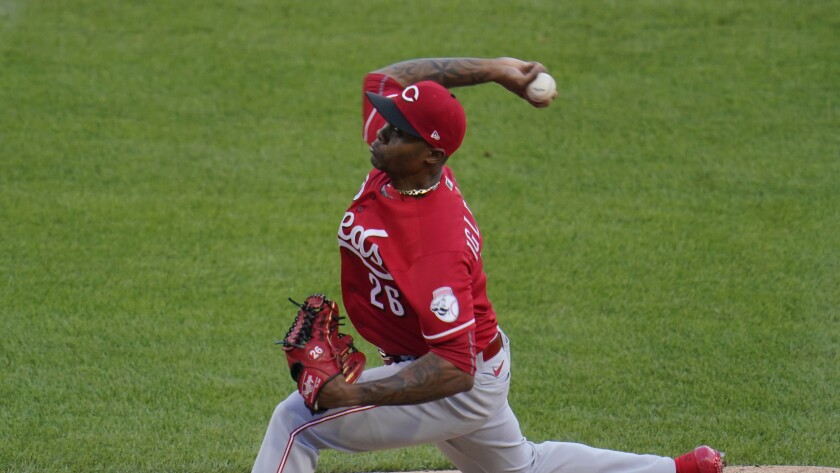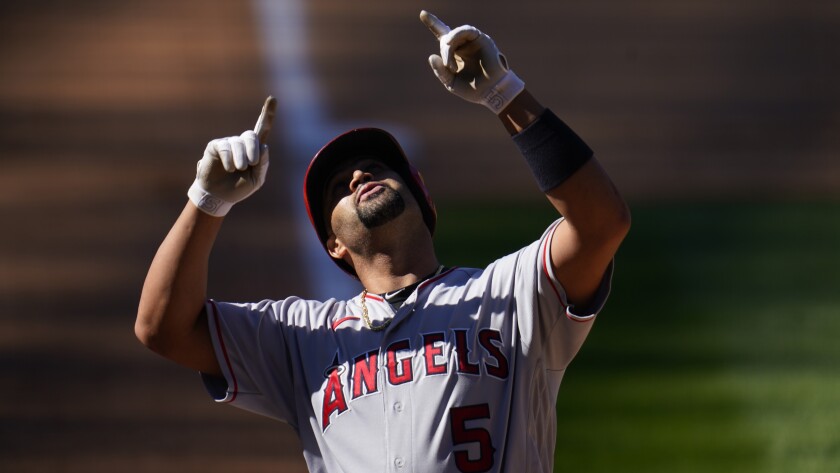Tens of thousands of infants in Southern California never have seen the Dodgers win the World Series.
For the rest of us, thankfully, the drought is over. No longer must every spring training preview include the required references to 1988, and to Kirk Gibson.
But let’s not do that 32-year wait again, OK? As the Dodgers prepare to defend their first World Series title in this century, and after they just signed Trevor Bauer for the highest annual salary in baseball history, can they become back-to-back champions?
No team has won the World Series in consecutive years since the New York Yankees won three in a row from 1998 to 2000. No National League team has won the World Series in consecutive years since the Cincinnati Reds in 1975-76, with a lineup that featured Hall of Famers Johnny Bench, Joe Morgan and Tony Perez, as well as Pete Rose, a Hall of Famer but for his betting on baseball.
What’s the biggest obstacle in the Dodgers’ bid to repeat?
Former Dodgers pitcher Yu Darvish, who spent the last three seasons with the Chicago Cubs, will be part of the San Diego Padres’ rotation this season.
(Nam Y. Huh / Associated Press)
The San Diego Padres, of course, but not just because they are really good.
The only teams that had a better record than the Padres last season were the two that competed in the World Series: the Dodgers and the Tampa Bay Rays.
San Diego has fortified its roster this winter. The team that started Zach Davies, Adrian Morejon and an injured Mike Clevinger against the Dodgers in the playoffs has acquired Blake Snell, Yu Darvish and Joe Musgrove for its rotation. The Padres also signed South Korean star infielder Ha-Seong Kim.
With the relative lack of competition in the rest of the National League West, and in all of the NL Central, the Dodgers and Padres might each roll up 100 victories. Since the advent of the wild card in 1994, no NL team has won 100 games but failed to win its division.
But, with expanded playoffs unlikely to return this year, the team that does not win the NL West would be forced into a wild-card playoff. The Dodgers could win 100 games over six months but lose the one-game wild-card playoff — because, as the cliché goes, anything can happen in one game — and their chance to repeat would go poof.
The Dodgers and Padres are scheduled to play three games during the final week of the regular season, at Dodger Stadium.
That NL Central is a mess. Is there a worse division in the majors?

Former Dodgers outfielder Joc Pederson will be playing for the Chicago Cubs this season.
(Eric Gay / Associated Press)
At the start of the month, no. But the St. Louis Cardinals gratefully accepted the Colorado Rockies’ donation of star third baseman Nolan Arenado, the Milwaukee Brewers signed second baseman Kolten Wong, and the Chicago Cubs picked up former Dodgers outfielder Joc Pederson. And, after a winter of trade rumors, the Cubs still have third baseman Kris Bryant, and the Brewers still have standout closer Josh Hader.
Milwaukee also welcomes back outfielder Lorenzo Cain, who opted out of the 2020 season. The Brewers are the only NL team besides the Dodgers and Atlanta Braves to make the playoffs in each of the past three years.
The Pittsburgh Pirates and Cincinnati Reds? Still a mess. The Pirates’ projected payroll this season is $40 million, the same as what the Dodgers will pay Bauer alone. The Reds lost their best starter (Bauer) to the Dodgers and salary-dumped their best reliever (Raisel Iglesias) to the Angels.
The Angels haven’t won a postseason game in 12 years. Is an Iglesias or two enough?

Former Cincinnati Reds closer Raisel Iglesias is among the newcomers for the Angels this season.
(Aaron Doster / Associated Press)
Not in itself, although Raisel Iglesias is an elite closer and new shortstop Jose Iglesias offers a smooth glove, if not the otherworldly one worn by the departed Andrelton Simmons. Rookie general manager Perry Minasian has added veteran stopgaps elsewhere too: catcher Kurt Suzuki, outfielder Dexter Fowler and pitchers Alex Cobb and Josè Quintana.
Still, the question this spring is the question of every recent spring: Can the Angels pitch well enough to get Mike Trout back in the playoffs for the first time since 2014? Trout, Anthony Rendon, Shohei Ohtani, Justin Upton and David Fletcher should hit. The Angels scored more runs than all but three American League teams last year; they gave up more runs than all but one.
The Angels aren’t about to play .600 ball, but here’s the thing: They don’t have to.
If the NL Central is not the worst division in the majors, then the AL West is. The defending champion Oakland Athletics abandoned their star closer (Liam Hendriks), a reliable reliever (Joakim Soria) and middle infield (Marcus Semien and Tommy La Stella) in free agency. Oakland also traded slugger Khris Davis to Texas.
The Houston Astros lost ace Gerrit Cole in free agency a year ago, posted a losing record last season, then lost center fielder George Springer in free agency this year. Star pitcher Justin Verlander is expected to miss the season as he recovers from Tommy John surgery. Houston also lost outfielder Josh Reddick and key relievers Robert Osuna, Chris Devenski and Brad Peacock to free agency, adding only former Dodger Pedro Baez.
The Seattle Mariners are building back from tanking, and the Texas Rangers are in mid-tank.
Of the top 50 free agents, as ranked by ESPN, one landed in the AL West: outfielder Michael Brantley, who re-signed with Houston.
Who is still in Houston from the cheating Astros of 2017, the year they beat the Dodgers in the World Series?
The infield, primarily: third baseman Alex Bregman, shortstop Carlos Correa, second baseman Jose Altuve, and first baseman Yuli Gurriel.
Fans did not get to boo the Astros last year, after commissioner Rob Manfred released the report on the team’s cheating. That’s a dead issue by now, right?
To the league, maybe, with A.J. Hinch returning from his suspension to manage the Detroit Tigers and Alex Cora returning from his suspension to manage the Boston Red Sox. Jeff Luhnow, the Houston general manager who could not find a job after his suspension expired, sued the Astros but reached a settlement.
To the fans? A.J. Pierzynski was booed in Anaheim for a decade after he apparently fooled an umpire in a 2005 playoff game against the Angels. Here’s predicting a high decibel level at Dodger Stadium Aug. 3-4, when the Astros return to L.A.
Why might Seattle hold a special place in Albert Pujols’ heart?

Could this be Albert Pujols’ final season with the Angels?
(David Zalubowski / Associated Press)
In 2018, Pujols recorded his 3,000th hit in Seattle. The Angels end the 2021 regular season in Seattle, which means Pujols might play the final game of his Hall of Fame career there.
For Pujols, 41, a three-time most valuable player and 10-time All-Star, this is the 1`0th and last year of his contract with the Angels. The pandemic-shortened 2020 season almost certainly robbed him of a chance to hit 700 home runs; he needs 38. Pujols, once the most feared hitter in the majors, has not been even a league-average batter since 2016, according to the OPS+ statistic.
Even if a team wished to consider him as a designated hitter next season, there is no guarantee there will be a next season. The collective bargaining agreement expires in December, and distrust between the commissioner’s office and the players union has not been so entrenched since 1995, the last time a season was interrupted by a work stoppage.
If the two sides cannot agree on whether to use a DH in both leagues this season, it is hard to imagine how they might agree on radical changes to baseball’s compensation system that reward the younger players so prized by data-driven front offices.
Strike? Lockout? Ugh. Just tell us which lineup might be the most fun to watch this season.
The Toronto Blue Jays ranked third in the AL in runs last season, and they have added Springer and Semien to a batting order stacked with prodigious young sluggers in Vladimir Guerrero Jr., Bo Bichette, Cavan Biggio, Lourdes Gurriel, Teoscar Hernandez and Rowdy Tellez.
So can we look forward to seeing the Blue Jays on Sunday night?
LOL. Of the 13 national broadcasts ESPN has announced so far, these are the number of scheduled appearances among AL East teams: the Yankees 3, the last-place Boston Red Sox 2, the defending AL champion Rays 0, the Blue Jays 0.






